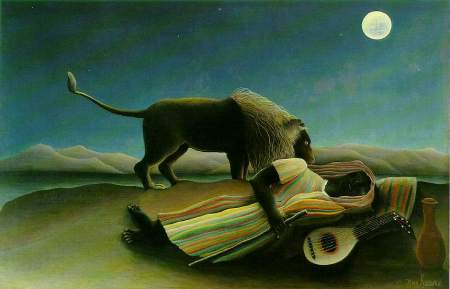 I read something interesting in the paper today. There is an exhibit at the National Gallery of Art in Washington DC of almost 50 paintings by Henri Rousseau. Even if you don’t know his name, you probably recognize his paintings. Here’s one and here’s another. (And just one more.)
I read something interesting in the paper today. There is an exhibit at the National Gallery of Art in Washington DC of almost 50 paintings by Henri Rousseau. Even if you don’t know his name, you probably recognize his paintings. Here’s one and here’s another. (And just one more.)
What caught my eye about this review is that Rousseau painted all his famous forest scenes from his workshop in Paris, not ever having visited these forested areas. How then, did he paint these scenes?
First of all, photography existed by the time of Rousseau’s life. He could study prints. This would not be possible in the time of, say, El Greco or Rembrandt. Such pre-photography painters would have to experience the forest first-hand, or rely on paintings or stories by others.
What does this have to do with composing? Simply this: Try composing what you don’t know. See what happens.
How do you do this? One way is to read music reviews. Reviewers will often describe a piece you have never heard. Read it and then use your musical imagination to jumpstart a new composition of your own. Or ask a collegue to describe a composer’s music that you don’t know; see how it tickles your musical imagination. Or, if you don’t know the music of Russia very well, imagine you are the court composer in the last days of Tsarist Russia.
There are myriad ways to explore the creativity of what you do not know.
Leave a Reply